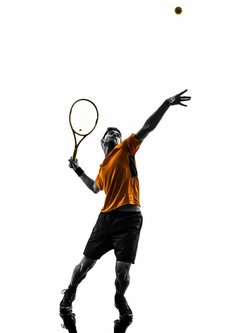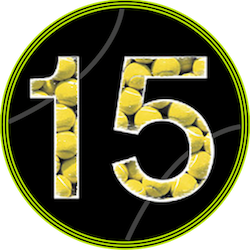|
There seem to be two divided camps. One telling players to hit harder, be more aggressive, and attack relentlessly. Another telling players to construct the point and play with consistency and margin. Sometimes this debate becomes associated with the American versus the European style of play. Can’t we all just get along...?
As with most conflicting beliefs, the answer is somewhere in the middle. It’s not black or white. And it’s not as if you fall in either the camp of consistency or the camp of aggression. Consistency and aggression are at opposite ends of a spectrum in which players fall in somewhere in between. Let’s look at both extremes. Playing with increased aggression will at some point have diminishing returns. Aiming at the lines will produce more winners, but it doesn’t make sense if only 40% of the balls go in. Therefore, aiming closer and closer to the lines or hitting harder and harder has diminishing returns. On the flip side, playing with increased margin will also at some point will have diminishing returns because if you chose to increase your margin of error to make 100% of your shots, you’d sacrifice placement and power to the extent your opponent would have a field day. Long story short, there’s a delicate balance - a "yin and yang" if you will. Each day that balance changes. If your strokes are feeling good, you might lean toward the side of aggression. If your strokes are off but the body is feeling good, then you might increase your margins and slug it out physically. A delicate balance indeed... You always hear stories of the 3 year old who hit the ball against the wall thousands of times. It's normally a success story.
Either way it builds good discipline because it's so darn boring. It's much like playing a grinder to hits a repeatable ball that lulls you to sleep, So... you have to keep your mind engaged on what you're doing/working on because there's not much external stimulus. Enjoy the simple pleasures of tennis like the feeling of the ball on your strings and your muscle systems working together. Hitting against a wall, among other isolated drills, is a great way to bring the focus on your body mechanics that are often forgotten during the dynamism of a match. Happy Easter! Tolerance To Pain, one of the five aspects of mental toughness, is something you can't avoid. Your legs will feel like they're on fire. Who's going to volunteer for that..?
You have to reframe the whole idea of pain. Here's some ideas: "The more pain I can take the stronger my body will be." "The more pain I can take the better I'll feel after having pushed myself." "The more pain I can take - that also goes for my opponent. And clearly I can take more." All pain is temporary. As Andy Roddick once put it, "I'll talk to my body about it tomorrow." At the start of a match, it may be wise to give yourself a margin of safety for the first few games. This means selecting safe targets to get your teeth into the match, feeling your legs beneath you to find the rhythm of the ball, and assessing your opponent's abilities to understand what might be most effective.
After those first couple games, once you've got a good sweat going and calibrated your strokes to the conditions of the court (because every match the conditions will be change), there's no reason you can't open up and take more risks. If you can start smacking winners from the first shot of the match like Roger Federer, then do it. But most players can't and there's nothing wrong with easing yourself in. Just don't mistake playing with a margin of safety with playing passive, conservative, or timid. All it means is don't aim for the lines! Anyone who is mentally engaged can be a tough opponent. Don't let your guard down... the moment you underestimate your opponent your intensity, effort level, and focus dips. When you give your mind permission to go on vacation, it may not be there when you really need it.
Smile... enjoy yourself on the court. Are you only in a good mood if you're playing well..? But what are the chances you'd play well if you were in a really good mood...? Maybe a better question is how often do you play well when you're in a really bad mood...? Maybe the correlation works both ways.
How you move influences how you feel, but how you feel also influences how you move. Keep that in mind... you can't necessarily control how you play on a given day, but you can control your attitude. The first four balls are close combat: the serve, the return, the 3rd ball, and 4th ball.
Close combat accentuates both the upside and downside of a situation. For example, a good volley can finish a point while a bad volley can lose it. The point will end either way. That's why they call it a one-two punch. A serve and 3rd ball or return and 4th ball will dictate how the point ends. Once a 5th ball is established, the point becomes far more structured like playing a point off a drop feed where you'd have to construct the point. Know your strengths and weaknesses to determine whether you'll do more damage in close combat or a structured scenario. It's interesting when players yell, scream, and get emotional.
It happens even more so in a team environment like college tennis, where there's a social element to impress your teammates - to appear as if you're trying really hard or that you care. I find it strange and misunderstood. Roger and Rafa don't obnoxiously scream or pout... I'm sure they'd do it if they found it beneficial, but nobody questions Roger's effort if he's stoic after a loss. Instead of wasting energy in senseless emotion, they focus all their energy into playing great tennis. Not to say Roger and Rafa won't reward themselves with a fist pump, but it's genuinely felt emotion and not a front to cover up an insecurity. Trusting your shot... walking across a balance beam a foot high is no problem right?
Raise the beam 50 ft in the air and you'll start trembling and second guessing yourself because now there's a serious consequence for failing. Remember that pressure is just an illusion. What's the worst that can happen if you lose a tennis match..? The consequences only have as much significance as you give it. So when players are having trouble translating their level of play from practice to a pressure situation, they need to remember it's the same balance beam. Hit or miss... you've got to trust your shot. Tennis is an impromptu exercise. You never know what's going to happen because the dynamic of the match changes with each opponent. It's also hard to predict because your opponent will make an adjustment to every adjustment you make.
Yes, there are general rules and guidelines, and yes, there may be general objectives you're trying to achieve strategically. But much like impromptu public speaking, where you wouldn't worry about exact words or phrases, don't worry about an exact shot or situation during a point. Know the end goal of what you're trying to accomplish, and like a public speaker who doesn't sound scripted and speaks from the heart, let your energy flow and your natural instincts guide you. Rafa takes a cold shower before every match... it's good in so many ways...
It stimulates your metabolism, the shivering is your muscles twitching to generate heat. You might temporarily hyperventilate but the deep breathing opens and expands your lungs. Your mind also is prepped for uncomfortable situations... People who take cold showers have a higher concentration of white blood cells, which means a stronger immune system. Take a look at the Wim Hof method... there's got to be some mental toughness if you're able to do that routine Nadal was probably fuming inside but keeps his composure regardless like a true professional... body language... don't try to change your body language; change your thought process... focus on the right things and the body language will follow
|
FREE 4 Step Serving Course
Get Technical Serve Training ONLINE
Click Here Categories
All
Archives |
To Get in Touch with Me:
Location
This site is not a part of the Facebook website or Facebook Inc. Additionally, this site is not endorsed by
Facebook in any way. FACEBOOK is a trademark of FACEBOOK, Inc.
Copyright © 15pointsoftennis.com. All Rights Reserved.
IMPORTANT: Legal Disclaimers
We don't believe in "magic pills" or "improve-overnight" programs. As stated by law, we can not and do not make any guarantees about your own ability to get results with our ideas, information, programs or strategies. We don't know you and, besides, your results in life and tennis are up to you. Agreed? We're here to help by giving you our greatest strategies to move you forward, faster. However, nothing on this page or any of our websites or emails is a promise or guarantee of future success. If you have questions, email [email protected].
Facebook in any way. FACEBOOK is a trademark of FACEBOOK, Inc.
Copyright © 15pointsoftennis.com. All Rights Reserved.
IMPORTANT: Legal Disclaimers
We don't believe in "magic pills" or "improve-overnight" programs. As stated by law, we can not and do not make any guarantees about your own ability to get results with our ideas, information, programs or strategies. We don't know you and, besides, your results in life and tennis are up to you. Agreed? We're here to help by giving you our greatest strategies to move you forward, faster. However, nothing on this page or any of our websites or emails is a promise or guarantee of future success. If you have questions, email [email protected].

 RSS Feed
RSS Feed